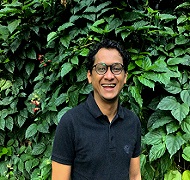ACF
Asian Cinema Fund
Script Development Fund
2017 Script Development Fund
LIST Magadir
| Category | Asian Project |
|---|---|
| Project | Magadir |
| Director | Sidi SALEH |
| Country | Indonesia |
| Director's Profile |
Sidi SALEH received a bachelor’s degree in cinematography from the Jakarta Institute of Arts. He entered the film industry in the early 2000s and has been continually active since. In 2011, Sidi made his directorial debut with Full Moon, a short film in the omnibus film Belkibolang, and thenceforth continuing his career as a film director. In 2013, he participated in film workshops at Berlinale Talent Campus. His third short film Fitri was in competition at the Clermont-Ferrand International Short Film Festival in 2014. Maryam won the best short film at the 71st Mostra Internazionale d'Arte Cinematografica Film Festival 2014 in Venice. |
- Synopsis
-
LAYLA (30) is an Indonesian Arab-descent widow, working as a bridal makeup artist. One day, her ex-husband, JA’FAR (40), and her uncle, MUHDAR (55), visit her to ask her to reconcile with Ja’far. FADLUN (60), Layla’s mother, declined as Ja’far cannot just reconcile with Layla. There are obligatory steps required by their religion: a divorced couple should marry another person to be able to re-marry their ex. The female party must be married to another man. After that man divorces her, it’s legal for the female party to reconcile with her ex-husband.
Ja’far has prepared a ‘puppet’ husband to marry Layla. AZIZ (35), a man with mental disability who is intentionally chosen for Ja’far to finally be able to marry Layla. The marriage is arranged in such a way and planned to only last for one month, and then Aziz must divorce Layla. Layla is in dilemma of choosing between being respectful to her family tradition and faith, and her own conviction.
- Director’s Note / Intention
-
Gender equality apparently remains an issue until now. This very issue has raised a question in my mind as a man born in a country with diverse traditions. The debate over the position of women in the society, either in the tradition of my own family or in the tradition of other places in the country where I was born and raised, most of the time it becomes a discourse that causes difference in understanding.
I am not trying to find the answer for this issue. I am intrigued by the perspective of women living in the tradition of my place of birth. I am interested in understanding and reinterpreting how women live in such situations and how they try to accept it.